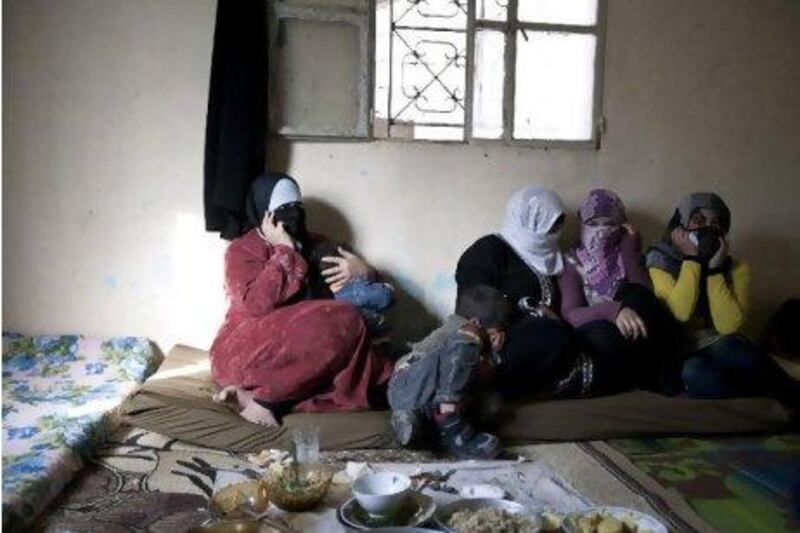"Everyone in Syria knows someone who has had their fingernails pulled out. They do the most medieval things on earth ... they slit the throats of women and children," explains Farouk, painting a grim picture of the kind of state-perpetrated violence and depravity that has provoked widespread action among Syrian expatriates living in the UAE.
The Syrian-American, who spoke to The Review on condition that his real name not be revealed - he fears his family in Syria could be targeted by the authorities - belongs to a loose network of Emirates-based expats who are rallying to help the population of their conflict-ravaged home nation.
According to a recent United Nations estimate, more than 8,500 people have died since the Syrian crisis began last year, and most of the dead were civilians. Farouk believes that the international humanitarian response has been unable to keep pace with the grim reality of daily life and the relentless killings in Syria.
"Bringing aid into Syria is officially illegal," he says, explaining why he and many other fellow countrymen and women across the UAE began, around 10 months ago, to raise funds and collect aid to smuggle into the country.
"I'm just one guy in a huge pool doing this," he says, adding that his network works with the Syrian Revolution General Commission, a coalition of 40 opposition groups, to get the aid to those that are most in need.
Lorries loaded with donated food, blankets, medical supplies, clothing, mobile phones and almost anything else they can lay their hands on, now depart from the UAE every five to 10 days. From there they travel through Saudi Arabia to Jordan and then across the border into Syria. And that's where it gets tricky.
In what Farouk describes as a country with a state security apparatus that is second only to North Korea's, the drivers, who are committing an act of insurgency by illegally transporting humanitarian aid, are putting their lives at risk every mile they drive and every time they pass through military checkpoints. "It is extremely dangerous," he says. "They could be shot or arrested and disappear forever."
When the contraband eventually reaches Damascus, it is divided into smaller shipments and transported deeper into the country in smaller vehicles and eventually split into parcels that are placed in backpacks or strapped onto motorcycles and taken to Homs, Hama, Idleb and Deir Ezzor.
"It is a very small drop in the bucket at a time, but at least it is something," says Farouk, a long-term UAE resident.
Here in the UAE, many members of the Syrian community work tirelessly to raise donations, a process sometimes complicated by the "culture of paranoia" that exists among expatriate Syrians.
Many fear that being identified as what Bashar Al Assad's regime terms a "financier of the revolution" could endanger their relatives at home.
This means that most expats prefer to make their donations, usually cash, through a non-Syrian third party.
"If a Syrian expat hears via word of mouth about what I'm doing, they will typically not want to meet me out of fear that I may be an agent working for Assad," says Farouk. "So they will ask their friend or colleague what it is that I need and then hand it over via that intermediary."
The Syrian expatriate community is divided - increasingly along sectarian lines - in its political loyalties, making the widespread distrust of fellow nationals more understandable.
"You get 10 [Syrians] together and one of them is an informant," says Farouk.
But one thing most Syrian expats can agree on is the urgent need for humanitarian aid as the civilian casualty figures continue to mount.
Farouk operates a website called The Revolting Syrian (www.the revoltingsyrian.com), which aims "to provide the world with daily updates on the brutal and shocking response Bashar Al Assad and his forces are using against the peaceful and freedom-loving people in Syria as they fight for their freedom and dignity".
Referring to the site's graphic content, he says: "It is not for the faint of heart. I try to guilt people into giving."
The network, which can be contacted via Farouk's website, welcomes donations of all kinds, including used mobile phones, baby formula, crutches, wheelchairs and any kind of prescription drug (including small quantities of unused painkillers, antibiotics and other pharmaceuticals sitting in people's medicine cabinets).
"The main thing [we need] is medicine and medical equipment. Most [non-Arabs] are wary of giving cash; they are uncomfortable with it. The next best thing is medical equipment.
"If you donate a can of baked beans, I will take it," says Farouk. "Nothing is too small. If all you can give is Dh10, I will make sure that it gets there. Every drop counts."
The network will even take medical equipment that has fallen into disrepair: "[Our people in Syria] are very resourceful. If something is broken they will fix it," says Farouk.
Most Syrians, however, prefer to donate cash, which is then transferred to Syria using the hawala system (an alternative remittance network) and that money is used to purchase blood bags, heart monitors, mobile emergency hospital units "and anything and everything in between", says Farouk, who has "raised Dh150,000 in the past few weeks alone".
Cash can also be earmarked by the donor for other purposes such as sponsoring a "martyr's family" or an orphan and funding civil disobedience projects such as "planting loudspeakers in government buildings and playing revolutionary songs", says Farouk, who is deeply impressed by the public response to the crisis.
"It really blows my mind. There are so many people giving from so many different backgrounds and countries. People in the UAE are very generous."
Paul Muir is The Review's production editor.





